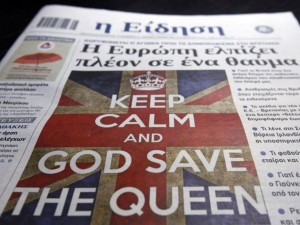
A Greek daily newspaper offers its take on the UK’s potential split with Europe. Many analysts predict Brexit could spur other member states to hold their own referendums. Getty
Reader discretion is advised.
Brexit: What will happen if Britain leaves the EU?
Oliver Wright, The Independent, June 19, 2-16
https://tinyurl.com/hm27np3
Oliver Wright explains just how seismic events will be if the Leave campaign prevails on Thursday
The result itself
Unless the result is very close, we should have a clear idea of whether Britain has voted for Brexit before the official announcement is made in Manchester. This is because individual local authorities will be declaring their results as and when the votes are counted, so we’ll have a good idea of what’s happening up and down the country before an official declaration. This declaration is not expected until about 5am, at the very earliest.
It is unlikely that David Cameron or Boris Johnson will make any kind of official statement until the official declaration. But both will do so shortly afterwards, especially if the result is not declared until just before the financial markets open.
David Cameron announces he will quit
Whichever way the vote goes, expect to see David Cameron making a statement outside Downing Street at around 7am. If it is a vote for Brexit, he may well use this opportunity to announce he will stand down and make way for another Tory leader to negotiate Britain’s exit from the EU.
He is unlikely to stand down immediately, though. Most people expect he will announce his intention to stand down so a new leader can be put in place by early autumn, in time for the Tory party conference. But despite everything he is saying now, there is no way he will carry on and negotiate Britain’s exit from the EU. If he tried, he would face a leadership challenge from Tory Brexit MPs, and he would lose.
Sterling falls, stock market falls, debt interest rates rise
As most financial markets still believe Britain will vote to remain (regardless of the polls), the impact of a Brexit vote is likely to be considerable. The pound will almost certainly fall significantly, as will share prices, with banking stocks and multinationals hardest hit.
It is possible that in order to try to stem the fall in sterling, the Bank of England will put up interest rates – at least in the short term. This would have a very ‘real world’ effect as it would mean the cost of mortgages and borrowing would immediately rise for us all.
Michael Saunders, a new member of the bank’s Monetary Policy Committee, has said he expects the pound to come under severe pressure. When he was working for Citibank, he wrote that Brexit risks were “nowhere near priced yet”, adding that Britain should expect between 15 and 20 per cent depreciation of sterling against Britain’s main trading partners.
The Bank of England has already said it has contingency plans in place that will be implemented in the event of Brexit. In fact, some of these plans will take place regardless of the vote. Next week, the bank will hold additional auctions of sterling to ensure the banking system has sufficient funds to operate in a potentially chaotic moment.
George Osborne will change his tune
While all the rhetoric of the campaign has been about the catastrophic consequences of Brexit, if we actually do vote to leave the Chancellor will do everything he can to calm the markets.
Expect him to emphasise how long it will take for a negotiated exit to take place, and expect him to reassure the markets that there will be no change in Britain’s relationship with Europe for at least several years. The name of the game will be buying time. That said, Mr Osborne may also announce he will stand down as Chancellor when a new Tory leader is elected. If Britain votes for Brexit, he would almost certainly rule himself out of the race to succeed David Cameron and would probably likely jump before he is pushed out of the Treasury.
David Cameron will invoke Article 50 of the Lisbon Treaty
This is a legal mechanism by which Britain withdraws from the EU. Mr Cameron could do this at any time, but it is perhaps most likely to happen at a meeting of EU heads of state on 27 June. If Britain does vote for Brexit, then this meeting will be of crucial importance anyway. It will be the first time that all 26 member states will be able to take stock of the decision of the 27th member to pull out.
But don’t expect any decisions at this meeting – Mr Cameron will not be the person negotiating Britain’s exit, so anything of substance will be put on hold until a new prime minister is in place.
(Read more of the story here.)

